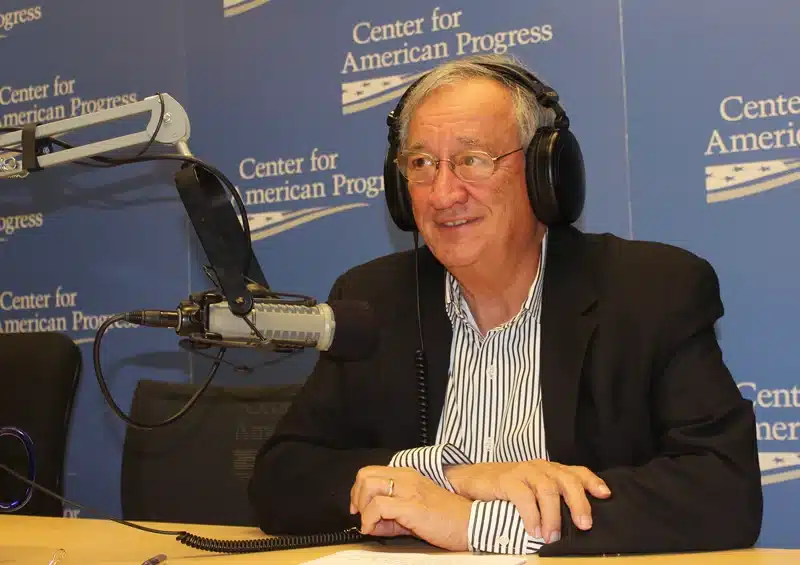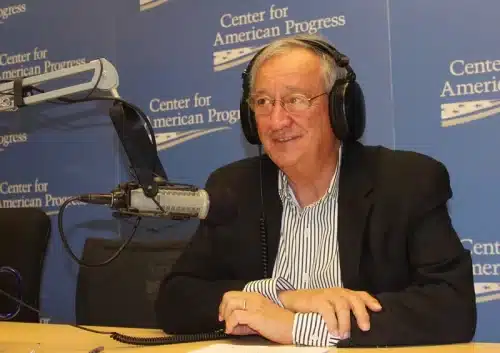
(RNS) — The Rev. C. Welton Gaddy, a pastor and former president of Interfaith Alliance who went from being a conservative Southern Baptist leader to an advocate for interfaith relations and LGBTQ Christians, died Wednesday (June 7). He was 81.
Interfaith Alliance announced Gaddy’s death in a statement, saying the organization’s former leader died in his home in Monroe, Louisiana.
“Welton stood as a source of inspiration to many,” the statement read. “He showed us that it was possible to hold on to our faith while also fighting for the rights of others who did not share our religious tradition.”

The Rev. C. Welton Gaddy hosts the Interfaith Alliance’s “State of Belief” radio show and podcast. RNS photo by Adelle M. Banks
Growing up in Tennessee, Gaddy went to Union University there before attending Southern Baptist Theological Seminary in Louisville, Kentucky, where he earned a master’s and a Ph.D. He went on to serve as a Southern Baptist minister, his profile rising within the denomination until he eventually served on the SBC’s Executive Committee.
But when Southern Baptists lurched rightward in the 1980s, Gaddy aligned himself with a new, more liberal-leaning group of like-minded faithful: the Alliance of Baptists, a denomination he is credited with helping create. He eventually found a steady pulpit at Northminster Church in Monroe, Louisiana, an Alliance of Baptists-affiliated congregation where he served as senior pastor until 2016 and pastor emeritus until his death.
In addition to his ministry, Gaddy also threw himself into the public sphere. He served as president of Americans United for Separation of Church and State before eventually taking over Interfaith Alliance in 1997, where he remained for 16 years until his retirement.
As head of Interfaith Alliance, Gaddy became a frequent critic of the religious right throughout the 1990s. He told Religion News Service he fashioned the organization to demonstrate that Pat Robertson, Jerry Falwell and others, who he said had “co-opted” the language of religious freedom, “don’t represent all Christians.” Indeed, Gaddy often sparred with Falwell and Robertson — the founder of the Christian Broadcasting Network who also died this week. He expressed contrasting views on everything from public presentations of the Ten Commandments to former President Bill Clinton’s impeachment.
Gaddy also voiced opposition to government-endorsed prayer and once served on a White House task force focused on “making the (White House faith-based) office constitutional,” despite telling officials at the time “You know, I still want it closed.”
He also organized in support of hate-crimes legislation and railed against the mistreatment of Muslims and Jews, once helping organize a ceremony at the United States Holocaust Memorial Museum to apologize on behalf of Baptist Christians for sins of “complicity” and “silence” regarding theology used to justify the oppression of Jewish people during the Holocaust.
“It was my privilege to know the man, not just the pastor or the public figure,” Rabbi Jack Moline, an emeritus president of Interfaith America, said in a statement. He later added: “In my Jewish tradition, we respond to a loss like this with the prayer, ‘May his memory be a blessing.’ It is and will continue to be.”
Gaddy, who hosted a regular “State of Belief” radio show that later became a podcast, was known for elevating religious voices in support of same-sex marriage and LGBTQ people — including LGBTQ Christians.
“It does not go without notice that we are remembering Welton just as the LGBTQ+ community is celebrating Pride Month,” the Rev. Paul Brandeis Raushenbush, Interfaith America’s president, said in a statement. “Welton wrote about full inclusion and dignity for LGBTQ+ people long before many other religious leaders. Across so many areas, Welton used his platform to project a vision for America that was inclusive of different beliefs and respectful of every individual’s inherent dignity.”
Gaddy is survived by his wife, Judy, as well as his son James and two grandsons. Another son, John Paul, died in 2014.
On Thursday, the Alliance of Baptists issued a statement celebrating the life of the group’s foundational leader, calling him “an integral member of a small group of Baptists who were committed to ensuring that all Baptists were not synonymous with fundamentalism.”
Gaddy may be gone, the statement said, but his legacy of forging a different vision for his Christian faith, as well as preaching respect for others, will endure.
“We will continue the work that he started,” the statement read.






